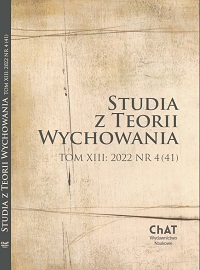Locus educanti dorosłych. Przykład parków naukowo-technologicznych
Adults’ locus educanti. The example of science and technology parks
Author(s): Marcin RojekSubject(s): Social Sciences, Education
Published by: Wydawnictwo Naukowe ChAT
Keywords: locus educanti; self-education; adult education; science and technology parks
Summary/Abstract: Adult learning experiences can happen anywhere. Everywhere does not mean "anywhere", but rather "somewhere", that is in places conducive to education, although not originally intended for this function. The article contains the thesis that science and technology parks are one of such unintended places of adult education. Although their complex function was to consist in the transfer of knowledge between universities and entrepreneurs, it is likely that in the individual experience of park users, parks perform a different function than assigned to them by the legislator and mass media. This article is theoretical and analytical, the research method was a qualitative analysis of the content of scientific papers, legal acts and websites, supplemented by a retrospective assessment of the author's experiences resulting from the function of the dean's representative for cooperation with the social and cultural environment and employers. The aim is to identify and characterize the educational potential of science and technology parks. The need for research on these issues results from the lack of analyzes of the educational dimension of the functioning of parks, with the simultaneous intense interest in economic and business aspects of their operation. As a result, parks are perceived only as places of implementation of economic policy, although all indications are that they can also support social policy, especially in the field of adult education. Edukacyjne doświadczenia dorosłych mogą się zdarzać wszędzie. Wszędzie nie znaczy „gdziekolwiek”, ale raczej „gdzieś”, czyli w miejscach sprzyjających edukacji, często z edukacją nawet nie kojarzących się. Artykuł ten zawiera tezę, że jednym z takich niezamierzonych miejsc edukacji dorosłych są parki naukowo-techologiczne. Chociaż ich funkcja złożona polega na transferze wiedzy między uczelniami a przedsiębiorcami, to jest prawdopodobne, że w indywidualnym doświadczeniu osób korzystających z parków, pełnią one przede wszystkim funkcję edukacyjną. Artykuł ten ma charakter teoretyczno-analityczny, metodą badawczą była jakościowa analiza treści prac naukowych, aktów prawnych i stron internetowych uzupełniona przez retrospektywną ocenę doświadczeń autora wynikających z pełnienia funkcji pełnomocnika dziekana ds. współpracy z otoczeniem społeczno-kulturowym i pracodawcami. Celem badania była identyfikacja i charakterystyka edukacyjnego potencjału parków naukowo-techologicznych. Potrzeba badań nad tą problematyką wynika z braku analiz edukacyjnego wymiaru funkcjonowania parków, przy jednoczesnych intensywnym zainteresowaniu ekonomiczno-biznesowymi aspektami ich funkcjonowania. W efekcie tego, parki postrzegane są wyłącznie jako miejsca realizacji polityki gospodarczej, chociaż wszystko wskazuje na to, że mogą także wspierać politykę społeczną, szczególnie w dziedzinie edukacji dorosłych.
Journal: Studia z Teorii Wychowania
- Issue Year: XIII/2022
- Issue No: 4 (41)
- Page Range: 213-230
- Page Count: 18
- Language: Polish

